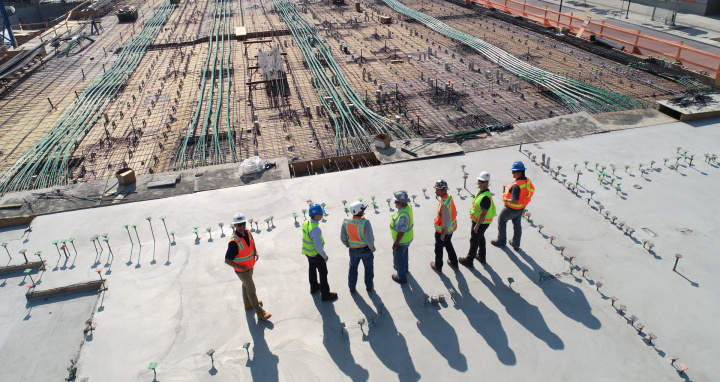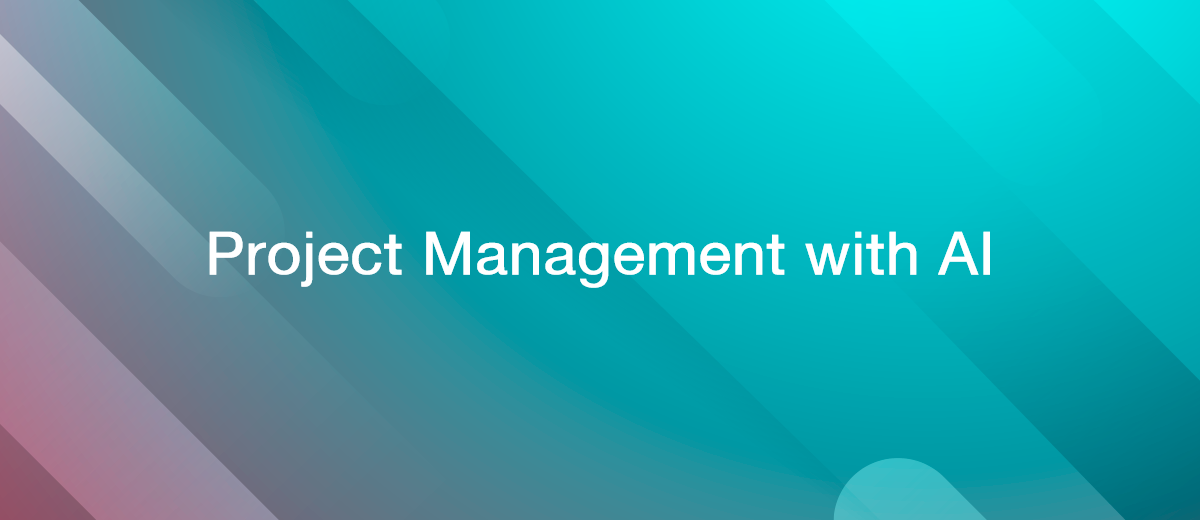5 Ways AI Can Streamline Project Management
AI-driven solutions are no longer the future — they’re the present. Organizations across the globe are using project management tools to automate manual tasks, help teams collaborate, and, above all, save time and money. Helping managers make more data-driven decisions about risks, resources, and project outcomes, these solutions can streamline processes at every stage of the project lifecycle. And in this article, we look at five key ways they do so.
Serving as your guide to discover how AI-powered project management tools can transform business operations, this article is for project managers of all expertise levels.
Automate Task Management
When managing project tasks manually, hours can be lost trying to set up strong processes and find relevant data. One spreadsheet might contain key deadlines while status information is found across various emails and documents. With this scattered approach, mistakes can easily creep in.
Project management tools are designed to automate time-consuming task scheduling, distribution, and tracking. Using information about team member availability, skill sets, and project dependencies, these tools can intelligently assign tasks to the most suitable individuals and send out emails accordingly.
They also provide a centralized location for details such as:
- Workflows.
- Meeting organization.
- Progress checks.
With all key information in one place, team members are brought together to collaborate more efficiently. They can clearly see their tasks and project managers can easily monitor progress. This method can reduce mistakes by increasing task transparency for all parties involved.
Streamline Document Management

Project management tools can help managers organize documentation throughout the project lifecycle. Here are some features they usually include:
- A centralized document repository where the latest versions of all key documents can be stored.
- Tools for seamless document sharing and collaboration among team members with tracked changes and comment functionality.
- Version history capability so you can track changes over time and recover important information if you lose it.
- Tags, folders, and search functionality to help project managers save time as they navigate through vast amounts of data.
- Integration with workflows so stakeholders can approve documents in a seamless way.
- Access control to ensure that only authorized team members can view certain documents.
Some project management tools also include a knowledge base feature for storing standard operating procedures (SOPs) and guides to streamline employee onboarding. With new and existing employees able to instantly access a hub of content relating to their projects, businesses can save both time and money.
- Automate the work of an online store or landing
- Empower through integration
- Don't spend money on programmers and integrators
- Save time by automating routine tasks
Rather than dedicating hours or even days to one-on-one training sessions, managers can direct employees to the knowledge base where they can independently learn and familiarize themselves with key information. This self-paced learning approach allows new team members to quickly become productive contributors to the project, feel supported, and learn best practices at a faster pace.
Optimize Resource Allocation
Especially when dealing with large-scale projects, bottlenecks like resource shortages, conflicting priorities, and unforeseen disruptions can cause huge problems for project managers. Fortunately, AI can enhance resource planning accuracy to prevent these factors from impacting productivity and project outcomes.
By leveraging machine learning algorithms and historical data analysis, project management tools identify patterns and trends in resource allocation, and estimate the time, resources, and budget required. This enables project managers to make more informed decisions and to keep costs down.
For example, in the case of a construction project, an AI-powered project management tool could analyze data from past projects, looking at factors like project size, location, weather conditions, and resource utilization. It could then predict potential resource shortages during specific phases of the construction and this would allow project managers to make arrangements in advance, such as procuring additional materials or hiring more skilled workers.

With better resource allocation and utilization insights, project managers can avoid overstaffing or over-purchasing, effectively cutting unnecessary expenses. And in enhancing efficiency and minimizing resource wastage over an entire project, AI can significantly help keep operational costs down.
Manage Project Risks
AI provides advanced analytics and predictive capabilities that empower project managers to identify, assess, and mitigate risks. Here's how that looks in practice:
- Predictive Analytics: AI can use machine learning algorithms to predict future risks based on past project data and current trends. This enables project managers to foresee potential roadblocks like resource shortages and to adapt their strategies accordingly.
- Project Prioritization: Project management tools can help managers to more efficiently identify projects with a higher chance of success by analyzing market trends, customer preferences, and historical data.
- Natural Language Processing (NLP): Project management tools with NLP capabilities can analyze data, such as project documentation, emails, and feedback to identify hidden risks or stakeholder concerns that might not be apparent through traditional methods. For example, they might scan through these resources to find phrases like "quality concerns" or "resource constraints" to flag concerns, perceptions, and gaps in communication.
- Real-time Monitoring: AI-enabled project management tools can continuously monitor project progress and performance metrics. This real-time tracking allows project managers to detect emerging risks such as budget overruns or scope creep and to take action before they escalate into more significant issues.
- Early Warning System: AI's predictive capabilities can act as an early warning system, alerting project managers to potential risks and deviations from the project plan.
- Scenario Planning: AI-driven simulations allow project managers to evaluate different scenarios and their potential outcomes. For example, project managers can use AI-powered scenario planning to simulate how different risk mitigation plans may affect the project's timeline, budget, and overall success.
Continuously Improve Processes
Project management tools play a vital role in facilitating continuous process improvement within projects and organizations. This is because they provide a comprehensive and structured framework that enhances project planning, execution, and monitoring. Here is how they do it:
- Provide data-driven insights including performance metrics, task completion times, resource utilization, and project outcomes. This helps project managers identify areas of improvement, bottlenecks, and inefficiencies in the project workflow in order to optimize performance.
- Support process standardization by providing a centralized location for project-related documents and templates, and best practices. This ensures consistency, reduces errors, and improves efficiency across projects.
- Encourage collaboration among team members and stakeholders by creating a continuous feedback loop alongside task schedules and key documents.
- Reduce repetitive tasks and give project managers more time to focus on strategic planning and a thorough assessment of project data and performance metrics.
- Promote a culture of continuous learning by storing lessons learned from past projects and supporting an iterative approach to project execution that enables teams to experiment, test, and refine processes.
To take an example of how the last point looks in practice, imagine that every week a software development company gets together to discuss performance metrics, task completion times, and customer feedback across projects. From here, they might decide to experiment with a new framework such as the Scrum methodology. They can easily sync their project management tools to record and track the results.
The Future of Project Management
AI project management tools present a clear opportunity to organizations looking to streamline their processes and support their project management departments. By outsourcing manual tasks, centralizing key documents, and gaining data-driven insights into risks and resources, they can gain more time to focus on carving out a continuously improving strategy.
This iterative learning approach, along with the insights generated from AI, can help them make data-driven decisions to maintain a competitive edge in their industry.
Apix-Drive is a simple and efficient system connector that will help you automate routine tasks and optimize business processes. You can save time and money, direct these resources to more important purposes. Test ApiX-Drive and make sure that this tool will relieve your employees and after 5 minutes of settings your business will start working faster.


